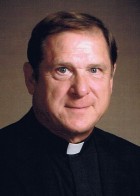Is reading, reflecting on Word of God a part of our personal prayer life?

Father R. Michael Schaab
By Father R. Michael Schaab
Twentieth Sunday in Ordinary Time/Aug. 19
Proverbs 9:1-6; Psalm 34:2-3,4-5,6-7; Ephesians 5:15-20; John 6:51-58
Meister Eckhart was a Dominican who was born in Germany in the 13th century. He was a philosopher, a theologian and a mystic. One quote attributed to him came to mind as I read today’s second reading from the letter to the Ephesians. Paul wrote, “Be filled with the Spirit . . . giving thanks always and for everything in the name of our Lord Jesus Christ.” Eckhart said, “If the only prayer we ever say in our lives is ‘Thank you,’ that will be enough.”
So, the first challenge found in the Scriptures for today involves our prayer life. Are we people who truly thank God always and for everything? Or, are we people who show up for prayer with our lists of complaints, requests and apologies? Or, even worse, are we people who don’t pray at all?
The Church’s most important prayer is the Mass and it is a perfect example of how we should pray. The Greek word for the Mass is “eucharist” which means “let us give thanks.” And we might take this challenge one step farther and examine how well and how often we thank others for being the instruments of God’s goodness in our lives.
If we are to live forever we need to eat the bread that came down from heaven in both the teachings of Jesus as well as in the consecrated host.
The other readings for today take us back to our ongoing reflection on the image of Jesus, the “living bread that came down from heaven.” The challenge in these readings is to understand that this image applies not only to the bread and wine of the Last Supper but also to “every word that comes from the mouth of God.”
In the reading from the Book of Proverbs we are told to “eat of my food and drink of the wine I have mixed.” This food and wine is God’s teaching found in the Scriptures. When Jesus says in the Gospel, “I am the living bread that came down from heaven,” he is referring to both the words he preaches and to his very being for he is “the Word made Flesh.”
RECEIVING NOURISHMENT
If we are to live forever we need to eat the bread that came down from heaven in both the teachings of Jesus as well as in the consecrated host. This image of consuming the Scriptures did not originate with the Gospels. It is a recurring image in the Old Testament. For example, God spoke to Ezekiel and said, ”Eat this scroll, and go speak to the house of Israel. So, I opened my mouth, and he gave me the scroll to eat. He said to me, Mortal, eat this scroll I give you and fill your stomach with it.” (Ezekiel 3:1-2) The coming of Christ into the world fulfilled the promise of God found in the Bible, but that does not mean that the Spirit of God no longer comes to us through the Bible.
And that brings us to applying this challenge to our own personal faith life. The Church recognizes that there is a real presence of God in the Scriptures just as there is a real sacramental presence of Christ in the Bread and Wine. That is why there is both a Liturgy of the Word and a Liturgy of the Eucharist in the Mass. In this most important prayer, the Church recognizes the presence of Christ in the words of Scripture and in the consecrated Bread and Wine.
But do we as individual Christians do the same? We may quickly respond that we do believe in the presence of Christ in the Scriptures as well as in Communion, but do we act on it in our personal prayers? Is reading and reflecting on God’s word part of our personal prayer? If it is, then we’ll discover the real reason for thanking God always and for everything.
—
Father R. Michael Schaab is a senior priest of the Diocese of Peoria who gives retreats and days of recollection, and fills in as presider at parish Masses on weekends. He resides on a hobby farm in Putnam County.





